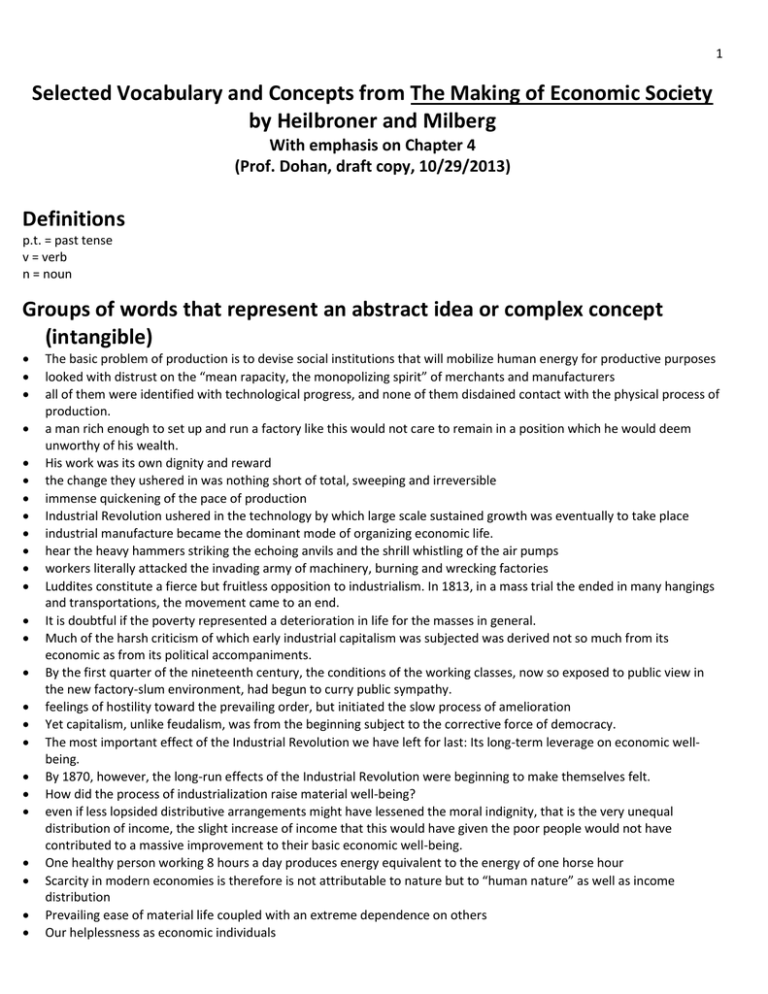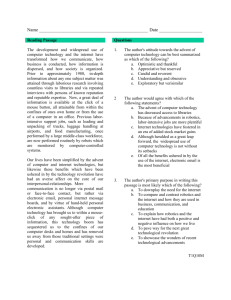Selected Vocabulary and Concepts from The Making of Economic
advertisement

1 Selected Vocabulary and Concepts from The Making of Economic Society by Heilbroner and Milberg With emphasis on Chapter 4 (Prof. Dohan, draft copy, 10/29/2013) Definitions p.t. = past tense v = verb n = noun Groups of words that represent an abstract idea or complex concept (intangible) The basic problem of production is to devise social institutions that will mobilize human energy for productive purposes looked with distrust on the “mean rapacity, the monopolizing spirit” of merchants and manufacturers all of them were identified with technological progress, and none of them disdained contact with the physical process of production. a man rich enough to set up and run a factory like this would not care to remain in a position which he would deem unworthy of his wealth. His work was its own dignity and reward the change they ushered in was nothing short of total, sweeping and irreversible immense quickening of the pace of production Industrial Revolution ushered in the technology by which large scale sustained growth was eventually to take place industrial manufacture became the dominant mode of organizing economic life. hear the heavy hammers striking the echoing anvils and the shrill whistling of the air pumps workers literally attacked the invading army of machinery, burning and wrecking factories Luddites constitute a fierce but fruitless opposition to industrialism. In 1813, in a mass trial the ended in many hangings and transportations, the movement came to an end. It is doubtful if the poverty represented a deterioration in life for the masses in general. Much of the harsh criticism of which early industrial capitalism was subjected was derived not so much from its economic as from its political accompaniments. By the first quarter of the nineteenth century, the conditions of the working classes, now so exposed to public view in the new factory-slum environment, had begun to curry public sympathy. feelings of hostility toward the prevailing order, but initiated the slow process of amelioration Yet capitalism, unlike feudalism, was from the beginning subject to the corrective force of democracy. The most important effect of the Industrial Revolution we have left for last: Its long-term leverage on economic wellbeing. By 1870, however, the long-run effects of the Industrial Revolution were beginning to make themselves felt. How did the process of industrialization raise material well-being? even if less lopsided distributive arrangements might have lessened the moral indignity, that is the very unequal distribution of income, the slight increase of income that this would have given the poor people would not have contributed to a massive improvement to their basic economic well-being. One healthy person working 8 hours a day produces energy equivalent to the energy of one horse hour Scarcity in modern economies is therefore is not attributable to nature but to “human nature” as well as income distribution Prevailing ease of material life coupled with an extreme dependence on others Our helplessness as economic individuals 2 “to whom does the surplus accrue?” What a wrench is the transition from farm to city existing poverty was not by any means new perishing from sheer hunger in the mud hovel or in the ditch by the wayside Complex concepts and theories scarcity of nature often in non-modern societies envisage the solitary individual crucial problem of survival Simple quest for bread relative social status reach of human wants division of labor Social harness Separate elemental tasks extraordinary spectrum of special tasks rules of kinship hereditary allocation of tasks stabilizing and impelling force scheme of economic life collegia of fraternal bodies reliance on slave labor adroit social organization bounty of the harvest sample kit of prototype well-nigh ubiquitous sheer self-perpetuation annals of antiquity pulse of trade strain of primitive communism economic morality swings of fortune political dissolution series of obligations mutually supportive degree of physical security “law of merchants” material riches church’s attitude toward trade was wary church’s horror of usury free play of market feudal relationship archaic forms from halt to halt time-hallowed social organization viable allocation leave a major imprint with the advent of typical scale of manufacture 3 sustained interest fecund mind technology of basic production current of economic life relatively changeless from year to year respectable proportions inherently possessing handmaiden of the others overwhelming prominence complex concatenation of events indispensable preparations a prime requisite of process of enclosures conflicts of interest landed power monied power abreast of every invention scientific farming beneath their dignity national patent system it fed upon itself brought all these factors into operation latent opportunities a man possessed by the technological possibilities machining accurate cylinders been successfully launched business acumen aristocratic patronage lower and middle ranks of the social order technical inquisitiveness of the time ostentatious splendor pot-bellied puddling process iron-clad patent meteoric careers sudden-burst rise of the factory sudden-burst piercing noise of the pulleys darting flames leaping from the blast furnaces uncongenial social habitat slack seasons determined by the weather packed and sterile earth feared and hated the advent of the machine grim age fire burning on the hearth dawn to dusk dry down life expectancy at birth political liberalism rise of living standards on a mass scale 4 ultimate impact notoriously long-working salient historic features stabilizing and impelling force (to stabilize (v), to impel (v)) languished on the job (to languish (v)) granaries bulged with grain (v, to bulge) Names of people, places, professions, and time periods you should know Demosthenes Leonardo da Vinci Matthew Boulton James Watt Newcomen John Wilkinson Adam Smith Wedgewood Karl Marx Friedrich Engel hinterlands hamlet bazaars Flanders Northern Italian The Continent Russian steppes Royal Society Reformation Renaissance Reformation England around 1750 Industrial Revolution Charlemagne’s holy roman empire “lord of the land” class of courtiers landed aristocracy Assyrian Aztecs pyramids pharaohs commentator guilds journeymen apprentices (v) free artisans cottage spinners factory overseer English industrial capitalist guild of hammermen Arkwright’s spinning jenny peasant cultivators 5 “New Men” large upper-middle stratum of commercial bourgeoisie coppers speculators mammoth hunters moors glaziers masons armorers metalworkers weavers foremen spinner hosiers artisan weaver laborer dyers steelsmith Verb based vocabulary often given in the present tense although you may have seen it in the text in the past tense to disdain, disdained (v, p.t.) to chronicle (v, to chronicle, or n) to sweep (v) to scatter, scattered (v, p.t.) to subordinate (v) to applaud (v) pinch (v, to pinch or n) huddled (v, p.t., to huddle) fluctuating (v, to fluctuate) slumbering (to slumber, v) unleashing (v, to unleash) to scrape up (v) liberating (v., to liberate) harnessing (v., to harness) leveraged (v, p.t. to leverage) isolated (v, p.t., to isolate) surveying (v., to survey) coined (v., p.t., to coin) hinged (v, p.t.) fade (v) stomped (v, p.t.) mirrored (v, p.t., to mirror) forges (v, to forge) creaking (v, to creak) hammering (v. to hammer) wrench (v. to wrench, or noun) 6 entitled (to be entitled to, v) to reign, reigned (v, p.t.) to warrant (v or n) to scan, scanned (v, p.t.) to alleviate (v) to censure censured (v, p.t.) to veil (v) to pierce (v) to unravel (v) to flourish, flourishing (v) to toil toiled (v, p.t.,) to accrue, accrued (v, p.t.) to cope with (v) to conceal (v) to patch up, patching up (v) to forge ahead (v) to court disaster (v) to pool, pooled (v, p.t.) to reinstitute, reinstituted (v, p.t.) to single out to marshal the energies to engage in the production of to loot warehouses to grind grain into flour to fashion, fashioned flour into bread(v., p.t.) to catch, caught game caught = p.t. to survey, surveying their attempts (v) to draw, drew equal allotments (v, p.t.) to till his fields to buckle down, buckling down to be laden with (v) to let slip by (v) to gain, gained their fortunes (v., p.t.) ingratiating oneself (v, to ingratiate) to ply, plied his trade (v, p.t.) to harness, harnessing the energies (v,) to integrate, integrated mills (v, p.t.) to jounce, he jounced about England (v, p.t.) to hum, humming of the bee (v.) to bar, barred from night work (v, p.t.,) Nouns irrigation ditches lord’s homestead rudimentary roads manorial estate local ecclesiastical lord genuine castle old-fashioned leather bellows nautical instruments 7 automatic screw machine machine plants Some of the more difficult vocabulary or words with unusual meaning in this context or multiple meanings tacit precondition Animal prey labor impressment surfeited (v, p.t.) chrematistike chevage heriot merchet suckled (v, p.t.) latifunda autarky asunder anomalous adjudicating interstices amalgamation ebullience panoply perilous attributes esoteric exploitative intransigence overarching replete with conjectures beguiled into (v) disconcerting provisioning (v) ignoble acquisitor inextricably retrenchment stasis genesis insularity fleeced (to fleece, v) unabashed advent of alchemy impetus locus 8 fortuitous catalytic epithet dunghill clangor Words that every college student should know for success scrutiny pageant humble fanaticism imperious premature subsistence wants (n) pressing wants chronic condition filthy allocative failures rash guise tradition hereditary sacrilege thine prowess gemsbok intestine udder expropriation implicit devoid consternation pedigree itinerant ox-towed barges parasitic gulf enclaves pillar galleys interplay stupendous devoid sordid petty affront alms inhabitant worldly 9 feudal feudalism deprivation ghastly dreadful secular simplistic tides veneer chaos anarchy compass shrunken nuclei pig iron sickle blade cutlery dim cellars (without light) sheds horse collar ignorant prevailing avalanches inconceivable waterpower windmills mechanical clock movable type salvation repression expanse of muddy irregular stagnation minuscule tollgates granaries crusades booty instructive heir cabinet dominant endeavor threads of cotton gadgets obsession henceforth counterparts rolling mill steam lathe 10 iron plates ironic haven steam pressure cylinder pistons piston-cylinder magnate buckles (n) millstones flourmill textile obscure spinning mill spindles arsenal chinaware patents cast steel tokens legend tyrannical pig-iron phenomenal wasteland *sustenance distasteful advent commonplace brisk intervals cog forefinger slums filth





